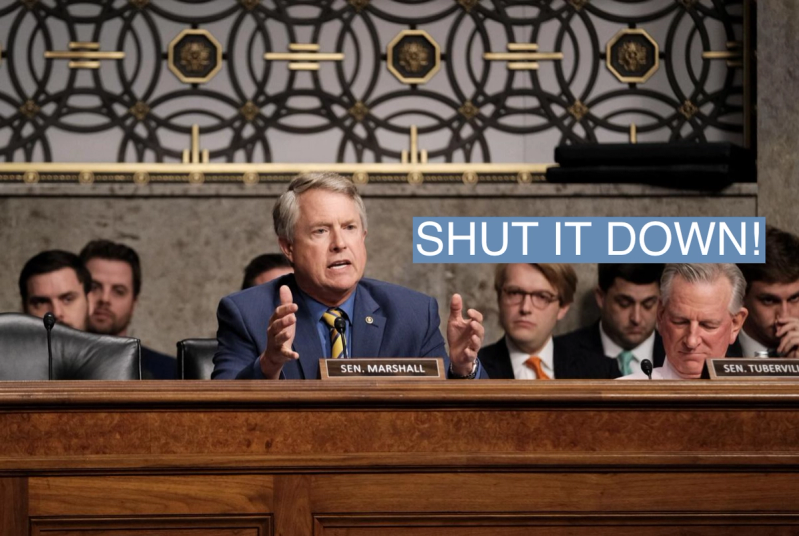The News

Just how big is the crypto backlash mounting in Congress?
Thursday afternoon offered a useful opportunity to take stock, as the Senate held its first hearing on the collapse of digital currency exchange FTX. The event kicked off a planned barrage of congressional inquiries into the troubled world of crypto and how it should be regulated. (FTX founder Sam Bankman-Fried is an investor in Semafor).
The hearing took place before the Senate Agriculture Committee, the panel responsible for what, until recently at least, has been considered the leading crypto bill on Capitol Hill. The legislation is facing intense scrutiny due to its associations with FTX founder Sam Bankman-Fried, who lobbied for it, in part because the measure would steer oversight of crypto to the Commodities Futures Trading Commission. Many critics view the agency as a relatively weak regulator with inadequate background in consumer protection.
But the committee’s leaders are not backing off their proposal. On Thursday, Sens. Debbie Stabenow, D-Mich and John Boozman, R-Ark., doubled down on the measure and argued it would have prevented the collapse of crypto exchange FTX. The only witness, CFTC chair Rostin Behnam, agreed.
In this article:
Joseph’s view
With the hearing in the background, the day offered an opportunity to measure what looks like a widening partisan gulf on crypto.
The list of Democratic of lawmakers willing to openly bash the industry appears to be growing. Sen. Tim Kaine, D-Va. told Semafor on Thursday that, when it comes to crypto, his “skepticism did not have any room to climb.” Sen. Mark Warner, D-Va. was only a bit more positive: “I’m still waiting to hear a real use case. I think the technology has some possibilities. But the hill’s getting steeper.”
But Republicans don’t seem to be turning on the industry the same way—at least for now. Semafor interviewed a half-dozen GOP senators and only one voiced some criticism of crypto.
Sen. Roger Marshall, R-Kan., who sits on the Agriculture Committee, was the lone GOP naysayer. He assailed crypto as “a national security threat” in a brief interview. He went as far to suggest the Securities and Exchange Commission or the CFTC should be allowed to step in and shut down all crypto use.
“Right now, we’re not even close to having our arms around it,” he told Semafor. “We should be considering a pause using this as a currency.”
Other Republicans are still believers in its potential. Sen. Tommy Tuberville, R-Ala., another GOP member of the agriculture panel, said the collapse of FTX was “a black eye” for the industry. He said he favors additional regulations, but sounded eager for the sector to bounce back. (He also disclosed that he owns some crypto assets of his own.)
“We gotta get confidence back in people that were in it and want to get in. And once we do that, it’ll jump back up,” he told Semafor.
It seems clear at this point that most policymakers in Congress are still grappling to understand crypto and the highly volatile alternative financial system that has evolved out of it. Marshall, for instance, didn’t seem to have any concrete plan in mind for how to hit pause on crypto trading.
But the Senate Agriculture Hearing also didn’t satisfy questions among crypto’s loudest skeptics, inside or outside of Congress, who are likely to keep up the pressure for a tougher regulation bill. Semafor asked Lee Reiners, policy director at the Duke Financial Economics Center, about Stabenow and Boozman’s claim that their bill would have prevented FTX’s implosion. “Of course not,” he said. “Senate Ag wants to absolve themselves and the CFTC and that’s what they tried and failed to do today.”
Sen. Sherrod Brown, chair of the Banking committee and another member of the agriculture panel, was also unconvinced.
“It’s clear that we have a serious problem,” he said. “It’s much larger than what they can address at [the Agriculture Committee] or CFTC.”
Room for Disagreement
Supporters of the $850 billion crypto industry argue that they haven’t lost their influence with the lawmakers most invested in regulating this realm. “I’m not super concerned that we’re going to see a huge rise in skepticism because of what’s happened,” Brett Quick, the head of government affairs at the Crypto Council for Innovation, told Semafor. “For folks that have been close to it, there really is that understanding that it was a bad actor committing fraud and not a crypto technology problem.”
Notable
- The New York Times columnist Paul Krugman published a column Thursday evening about blockchains, the decentralized databases that underpin digital currencies like bitcoin. Technologists sometimes argue that even if specific cryptocurrencies may not be useful beyond speculation, blockchains could turn out to have important applications. Krugman’s doubtful. “This is looking more and more like Fimbulwinter, the endless winter that, in Norse mythology, precedes the end of the world — in this case the crypto world, not just cryptocurrencies but the whole idea of organizing economic life around the famous ‘blockchain.’”

